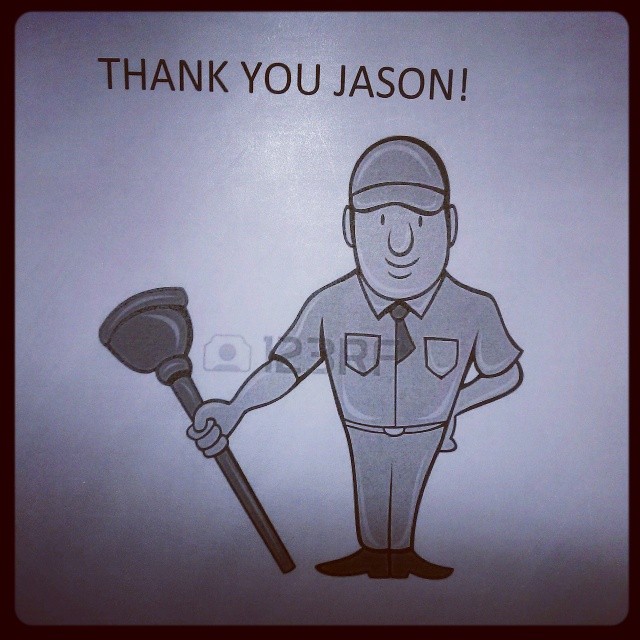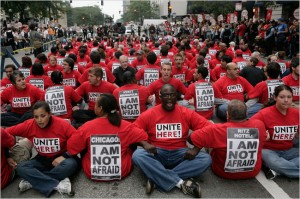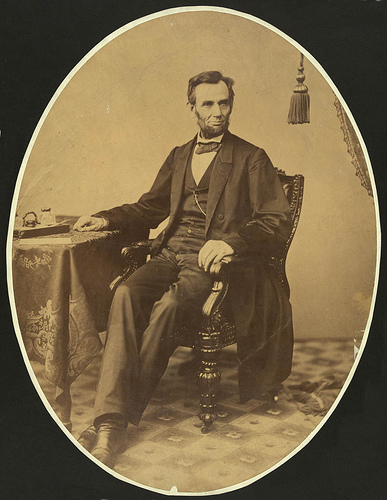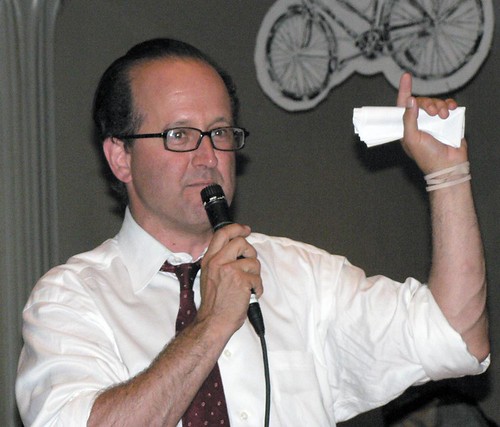In the midst of [waves arms] all of this, I’ve met some truly wonderful humans these past few weeks. People who are working to make the world a better place in real, tangible ways. Right where they live, and in places they’ll likely never visit. As has always been the case, the bad people count on us to despair in the face of the structures they’ve built and the atrocities, large and small, that those structures enable. And as has always been the case, we refuse to stop fighting. Because there is no alternative but to build a better world. I don’t mean this in some polyannish way. Things are awful. But we’re strong and we’re guided by love and rage and community and compassion and I really do believe we’ll win. We have to.
Leave a CommentCategory: Labor movement
Ink
He pedaled his bike from the rented house
to the tattoo shop.
He was 35 years old.
He rode past the shop, went up a couple blocks.
Turned around.
Rode back, but out of sight of the big window.
Took a deep breath. Went in.
He showed the tattoo artist what he wanted.
A bicycle chain wheel with a peace sign
inside it: the Peace Cog.
“No problem,” said the artist.
Tommy, his name was.
Tommy went into the back.
The 35-year-old with his bare arms
waited on a vinyl chair,
back to the big window
and the traffic on the street outside.
After a few minutes Tommy returned,
the design drawn on a tissue-thin paper.
“Come on back,” Tommy said.
*
Later, at the union hall, a young coworker
spotted the ink on his forearm.
“Dude, did you get a tattoo?”
He felt … was it cool? Was he cool?
“Yeah,” he said.
/ / /
31 August 2023
Charlottesville VA
This is poem 41 in a series called 50 Days Till 50 Years. I’m writing a poem a day for the 50 days leading up to my 50th birthday. I’m going to try to focus on memories of my past, and the people who inhabited it.
Leave a CommentOfficer Unfriendly
I would grab a bullhorn and taunt the cops.
I’d make fun of them right to their faces,
from a few feet away, to make the workers laugh.
Picket lines are long and hard and too cold or too hot.
Morale is kept up by humor as much as righteousness.
I shouted insults at the cops, whose faux unions
are always on the side of the oppressor, who stand
in their own picket lines, firmly opposed to justice.
I used my whiteness, my maleness, as a shield,
provoking and absorbing and deflecting their anger
from the workers who didn’t look like me,
who couldn’t afford any trouble,
but who were marching anyway because
they knew that enough was enough.
I didn’t teach my kids to ask cops for help.
I told them to never talk to the police.
Unless you’ve got a bullhorn and a big crowd.
Then you can make an exception.
/ / /
19 August 2023
Charlottesville VA
This is poem 29 in a series called 50 Days Till 50 Years. I’m writing a poem a day between now and my 50th birthday. I’m going to try to focus on memories of my past, and the people who inhabited it.
Leave a CommentSolidarity
We were in one of those restaurants that had decided
the 70s were plenty modern enough, thank you,
and had kept their fake wood paneling for thirty years.
One by one the hospital workers filed in,
dropping their folded pieces of paper into a box
while the union staff and the bosses watched.
It was my first campaign. My first time seeing
people decide whether to take back control of their lives.
Earlier that afternoon I’d been on the phone for hours,
making sure people came out to vote, reminding them
why it mattered, why they’d ever wanted a union.
As the sun set and darkness came on, the line slowed.
Finally it was over. The time limit was up. All that was left
was to dump out the ballot box and answer the question
we’d been working months to pose.
The counting felt like an eternity. Then:
A victory – the workers had voted to form a union.
I ran outside and burst into tears, then called Julie,
the organizer who’d trained me, to tell her the news.
I could hear cheers from the restaurant.
They got louder as I headed back inside.
/ / /
25 July 2023
Charlottesville VA
This is poem #4 in a new series, 50 Days Till 50 Years. I’m writing a poem a day between now and my 50th birthday. I’m going to try to focus on memories of my past, and the people who inhabited it.
Leave a Comment
Chris & Jeff at the bar (aka the sages of Temperanceville)
Jeff leans over to Chris like a conspirator:
“They’re tryin’ to turn everything into fuckin’ ‘right to work.’”
He looks up at the TV news, snorts air through his nose.
On the screen: West Virginia teachers on strike.
“They wanna take everythin’ away from ’em,” Jeff growls.
Chris nods, on his fourth phone call in 10 minutes.
“How many I got left, hon?” Jeff asks the bartender.
(She’s flying past, cradling a basket of bread
like a newborn babe.) “You’ve got one, Jeff.”
“I’ll take it, then, and give Chris one more, too.”
Next story: the baseball players union is suing the league.
“Good for them. Give it to ’em!”
Welcome to Pittsburgh. Eat your hoagie.
/ / /
Jason Crane
27 February 2018
The Village Tavern
in Pittsburgh’s West End
(formerly Temperanceville, PA)

Peter, George, John, Joseph, Silas, Henry and Tom
pop!pop!pop!
Pinkerton rifles filling the air
with smoke & screams & blood
pop!pop!pop!
men of iron & steel
men of flesh & bone
pop!pop!pop!
the ground soaks up the evidence
the birds scatter; no witnesses
now: the furnaces shut, rusting
mud colors the Monongahela
two robins rest on a sign
listing the names of the dead
/ / /
Jason Crane
21 Feb 2018
Pittsburgh PA
This poem is inspired by the Battle of Homestead, which took place just down the road from my hotel. On July 2, 1892, Pinkertons hired by a steel company murdered seven striking workers, all members of the Amalgamated Association of Iron and Steel Workers. Three Pinkertons were also killed. Shortly thereafter the government used the state militia to bust the strike and break the union. The poem’s title is a list of the names of the seven murdered workers.
Leave a Comment
I Got A Raise And It Made Me Angry
Yesterday I got a raise and I left work feeling very annoyed. One thing I’ve been working on a lot in my Buddhist practice is trying to both isolate the part of the body where the feeling resides and also to think about what made the feeling arise in the first place.
Three things bothered me about my raise.
The first was the meeting in which it happened. I make $10 an hour with no benefits, because I can’t afford our benefits at $10 an hour. I asked for $12 and got $11. In the meeting, my two bosses were really pulling out all the clichéd stops to try to devalue my work as much as possible, even while giving me more money. I finally stopped them and reminded them both that I’ve negotiated union contracts with multinational companies, and that the meeting we were in didn’t need to happen the way it was happening. I also pushed back on their devaluing statements. Although I was proud of my stance in the meeting, I still disliked the general feeling of conflict, and also the renewed realization that I work in a nonunion job for people who don’t care about their employees.
The second issue was a negative, but it led to a positive. I was embarrassed to be having a conversation in which I needed to justify to someone why I should make more than 133% above the Pennsylvania poverty line. I’m where I am because of the choices I’ve made and I know that. But it’s 2014 and EVERYBODY is worth more than $10 or $11 or $12 an hour. To be sitting there in my white shirt with my employer’s name on the left pocket asking for $80 more a week before taxes was humiliating. Again, not because I’m above it, but because everyone is. However, it led to this commitment: This is the last of these conversations I will ever have. I already had the goal of becoming a full-time freelancer by the end of 2014, and this meeting renewed my commitment to never justifying my worth for a low-paying job again.
The final issue was more personal. In the meeting, it came out that something I’d told a co-worker in confidence had made it to our boss. However, the thing I’d told her – that I was uncomfortable taking on her duties (she has a broken arm and needs to farm out paperwork) while making poverty wages – had put her in a difficult position, so I mostly felt bad about that. I apologized to her this morning.
So much is bound up in our working lives. I’m going to do everything I can to be the person who controls that part of my life.
/ / /
The photo at the top of this post is of a note I received from my boss this afternoon (about 8 hours after writing this post) because I unclogged the men’s room toilet.
4 Comments
superheroes
well into my teenage years
I had Batman posters on my walls
and a painting of the Dark Knight
done by a friend (now departed)
after every heroic action movie
I emerged into daylight
imagining myself stronger, faster
ready to take on all comers
to defend what I thought was right
in later years I saw immigrant women
stand up against powerful rich men
on behalf of themselves
and their coworkers
I realized superheroes do exist
but we spend so much time looking
up into the sky for them
that we miss them all around us
down here on the ground
11 August 2012
Auburn AL
Listen to this poem using the player above.

Rough Boys
“Remember when Frankie got taken out?”
Three shop stewards are sitting along a marble wall
on Park Ave near Grand Central
talking about the old days.
“You wouldn’t fuck with Nicky Torres.”
They remember heated words in cramped offices,
big men with tattoos from the war
who didn’t take shit off anyone,
no matter how good a college you went to.
“As soon as they found out you were with Nicky,
their whole attitude changed.”
Men who drove in to the office in nice cars
felt their collars tighten and the sweat on their foreheads
as strap-hanging third-generation laborers
let them know how things stood.
“Nicky would raise his hand
and everybody would stop working
until he put it back down. He got what he wanted.”
There aren’t many places left where men talk about the union
like it was an unpredictable beast.
Like it prowled the shop floor, muscles rippling
under taut skin. Like its hot breath
could cause the boss to think twice before mouthing off.
When Frankie got taken out,
it was because Nicky Torres told the plant manager,
“Either this asshole goes
or you’re not gonna have much to ship out on them trucks.”
Frankie left, and Nicky put his hand down.
I don’t work in a cubicle, but I am a fan of the labor movement and thought this ad from ThinkGeek was funny:
Leave a CommentFellow cubicledwellers, join us in solidarity against The Man. OfficeMax estimates there are 80 million cubicle workers worldwide. And they’d know, cause they’re trying to sell them all one of those mousepads that stinks. Imagine the collective bargaining power of 80 million people crying out for one thing: doors.

Today is Abraham Lincoln’s birthday, which seems like a good time to mention that back during the Civil War, two of my cousins were jailed by Abraham Lincoln for sedition. You can read the entire story in the March 2006 issue of Flanders Family News. (This links to a PDF file. The story starts on Page 9.)
Enjoy!
By the way, lest you interpret this the wrong way — I’m a big fan of Lincoln. But how could I pass up this story?
Leave a CommentLuxury Hotel
Room after room after room with no stopping, no let-up.
How many in a year? Five thousand? Six thousand?
The human body can only take so much.
So many liftings of the mattress, so many bends of the knees.
Then there are the chemicals, the solvents, the cleaners.
Scrubbing with your face right down in the fumes,
breathing deeply from the exertion.
Cracked skin, aching muscles, arms like rubber.
You can’t even lift your baby girl for a kiss.
Other people’s pubic hair, other people’s vomit and blood.
One time there was a man hiding in the closet.
He put one finger to his lips and told you to be quiet,
but how could you be quiet when there was a man in the closet?
So you screamed and ran and they gave you half a day off.
Another time you begged and begged for shoes,
the kind with the special soles so you wouldn’t slip.
After days and weeks and months, they ordered them
on the very day your head hit the tile floor,
the same day they cornered you in the manager’s office
and nobody called for a doctor, the same day
you passed out waiting for the bus and a passerby
took you to the emergency room. A stranger had to do that.
There are seven Dominicans and three women from Jamaica
and five Senegalese and one Vietnamese lady in the laundry
with no English who keeps to herself in the mouth of the furnace.
Eight hours, ten hours, twelve hours if it’s busy.
Then it’s home to cook and do your own laundry and help
Javi and Lisa with their homework. Make the lunches
for the next day. Shrink into the bed and fall asleep
to the throbbing in your joints. The alarm at 4 a.m.
Then it’s room after room after room with no stopping, no let-up.
How many in a year? Five thousand? Six thousand?
The human body can only take so much.

Labor writer and activist Jonathan Tasini
Jonathan Tasini has written a simple and compelling piece about NY Gov. David Paterson’s call for pension givebacks for state employees. Here’s the core of Tasini’s argument:
We could wipe out the budget deficit–or, certainly trim it down to something trivial–by raising taxes on the very wealthy and going back to a more progressive taxation system that we had in the 1970s. You know this: if the state replaced the existing rate structure (consisting of 5 brackets with rates ranging from 4.0 to 6.85%) with one consisting of 14 brackets with rates ranging from 2.0 to 15.0%, we could bring in $6-7 billion more, and perhaps as high as $11 billion.
Under this plan, 95 percent of the state’s taxpayers—95 percent of the people—would receive a tax cut. Like the proposals championed by President-elect Barack Obama, a more progressive taxation system would be easing the burden on the people who are the most at risk in our economically troubled times. The top one percent of taxpayers—whose average income is $2.685 million—would see their taxes go up about 5.4 percent. The four percent below that top one percent—those people whose average income is $326,000—would have their taxes rise 1.4 percent.In fact, the top five percent would have their dues burden slightly reduced because higher state taxes would lower their federal obligations.
Everyone else would realize a reduction in their taxes.
I highly recommend the rest of the article, too.
Leave a CommentI work for the labor union UNITE HERE. This is from their Web site:
“Watch GritTV for UNITE HERE President Bruce Raynor’s thoughts on the election, the auto industry crisis and the Employee Free Choice Act. Defending auto industry workers’ right to earn a middle class living and pointing out the concessions that the United Auto Workers have already made, Raynor goes on to explain how the U.S.’s lack of national health care has disadvantaged the auto industry. He calls today’s political environment ‘a storm of need, and possibility.'”
Leave a Comment